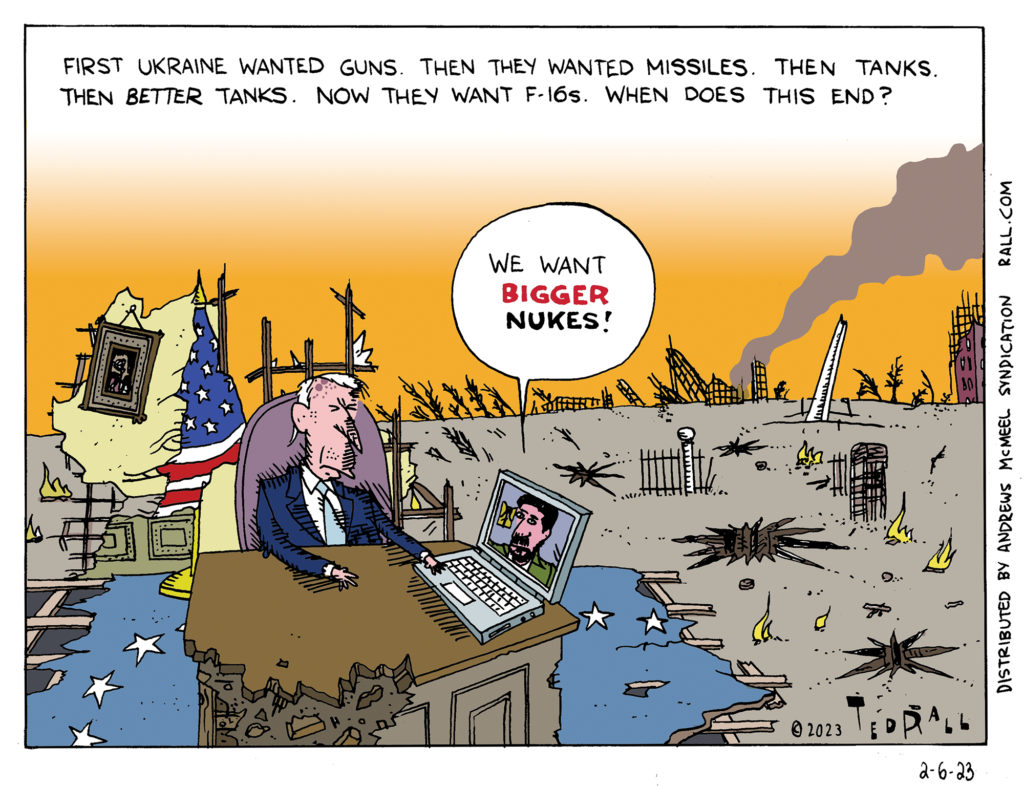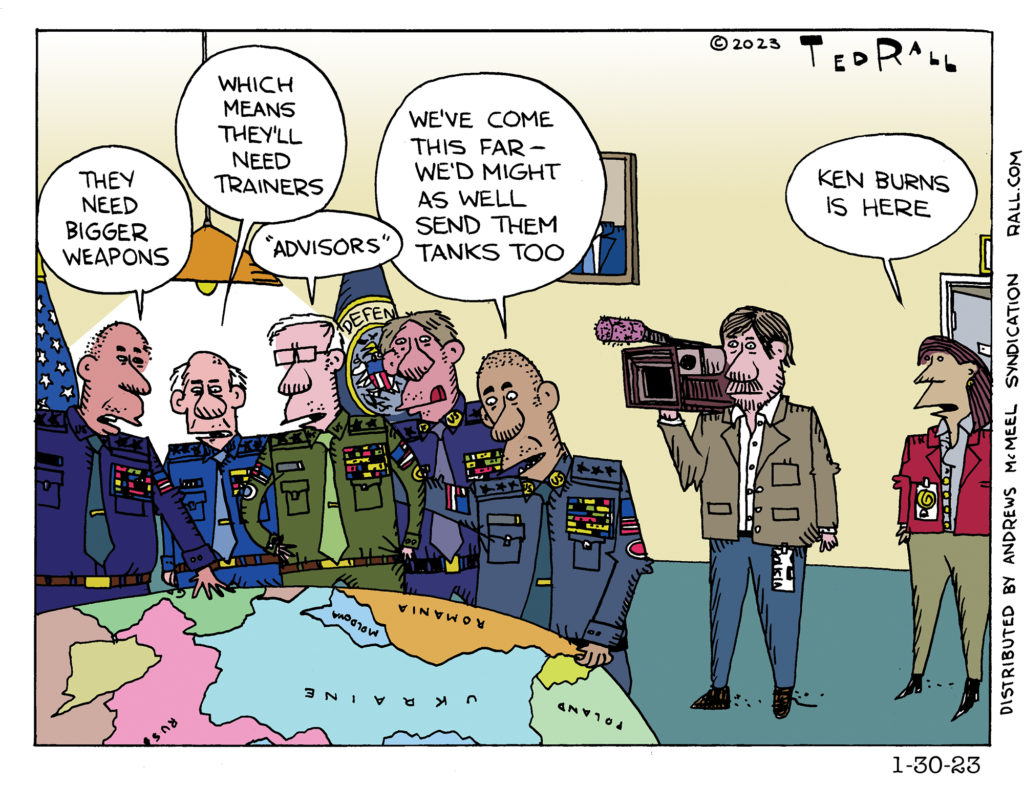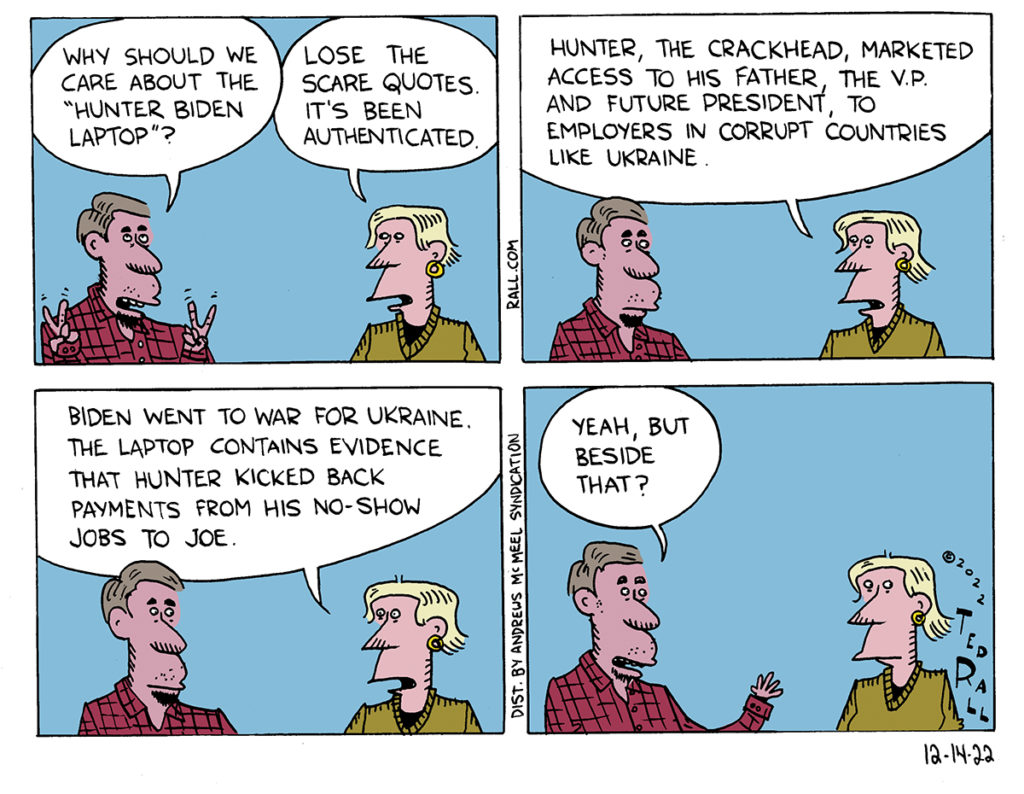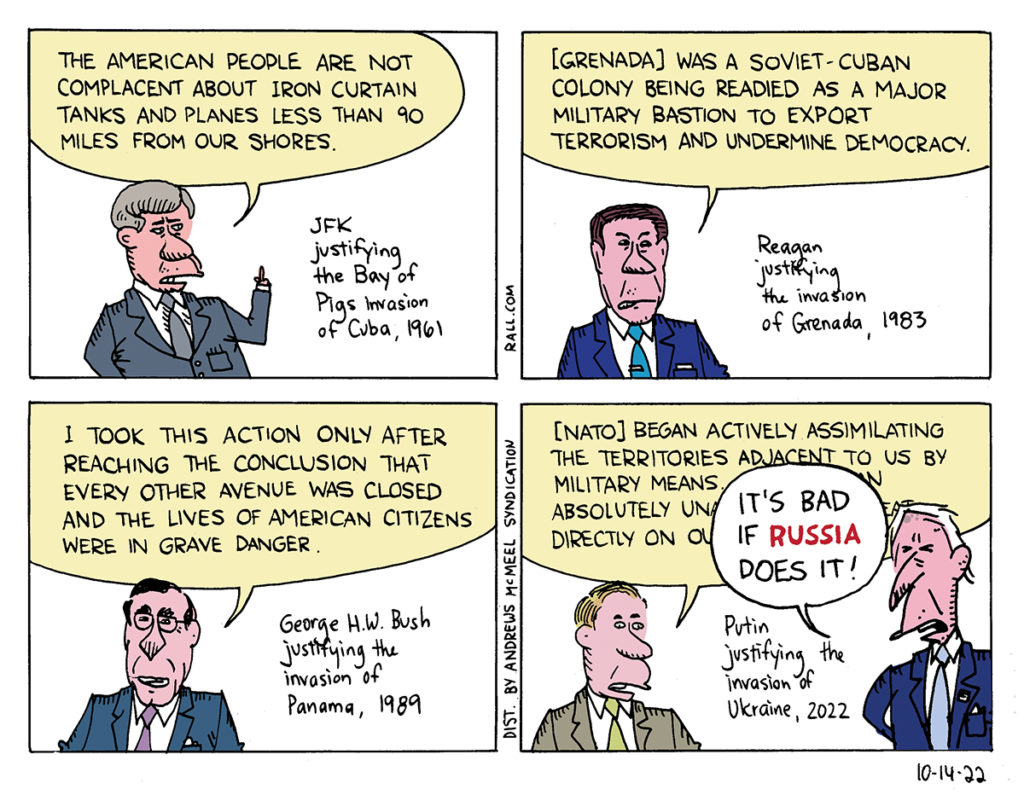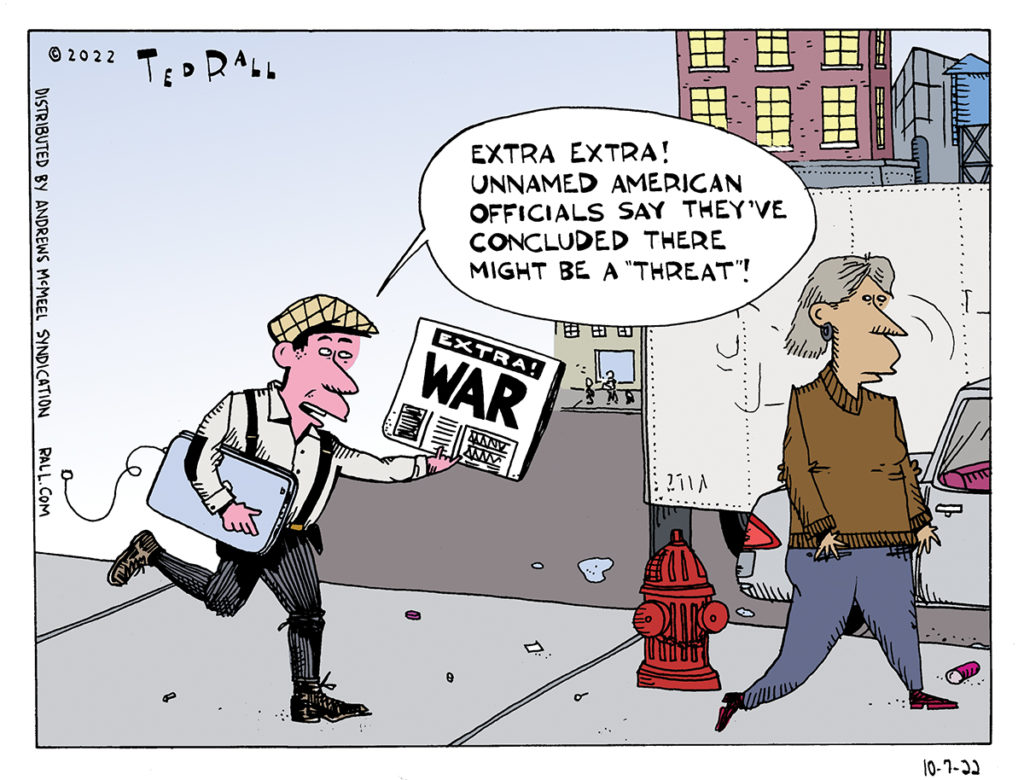In the classic fairy tale, the wife of a fisherman keeps demanding more and more of an enchanted flounder. Ukrainian president Volodymyr Zelensky keeps coming back to Joe Biden for more weapons, bigger weapons, always more and more. At the same time, he claims that his country is winning.
DMZ America Podcast #86: Tyre Nichols Killed by Memphis Police, Biden’s Beach House Searched by the FBI, Now Ukraine now wants F-16s Too
Progressive editorial cartoonist Ted Rall and Conservative Scott Stantis discuss and debate the breaking news of the day. They take a deep dive into the murder of Tyre Nichols at the hands of the Memphis Police’s Scorpion Squad. What should real police reform look like? Scott and Ted offer an in-depth plan for turning the police from brutish adversaries to supportive problem-solvers. Next, Ted and Scott turn to the breaking news that Biden’s Delaware beach house has been searched by the FBI in search of classified documents. Is the Federal Government classifying too many documents? What about the implications for 2024? Lastly, Rall and Stantis look at Ukraine, whose leaders are now asking for fighter jets on top of all of the military equipment the United States taxpayers have already gifted them. Scott and Ted consider if the U.S. should even be involved at all in this seemingly endless conflict.
Ken Burns Is Here
Like the fisherman’s wife in the fairy tale, Ukraine keeps asking for more. More money, more weapons, more missiles, now more tanks. Reports say that they are now asking for U.S. fighter jets. Anyone familiar with the history of escalation that led to disaster in the Vietnam war, not to mention Afghanistan and Iraq, knows how this game ends.
DMZ America Podcast #84: Debating the Debt Ceiling, Biden’s Secret Papers and Potpourri
Internationally-syndicated Editorial Cartoonists Ted Rall and Scoot Stantis analyze the news of the day. Starting with a brisk debate about whether or not the Debt Ceiling should be lifted or if there should be one at all. Next, Ted and Scott weigh in on Secret Documents President Biden had piled up in his garage. Does this preclude a run for reelection in 2024? Lastly, a potpourri of topics ranging from the Wyoming Legislature proposing a ban on the purchase of electric vehicles to the Russian troop buildup in the west of Ukraine to recent projections that 90% of online content will be generated by AI by 2025. (This podcast is not, btw.)
Invasions Are Only Bad When Russia Does Them
From the Monroe Doctrine to the ongoing blockade of Cuba, the United States has repeatedly exerted and exercised its prerogative to invade any country in its immediate region, up to and including the entire Western hemisphere, if it perceives a threat of any kind, whether real or imagined. So it’s a bit baffling that so many Americans violently deplore Russia’s invasion of Ukraine, which is right along its border, after Ukraine threatened to join NATO, an anti-Russian military alliance.
DMZ America Podcast #70: Ukraine War Update, Are These the Most Consequential Elections in Modern Times? How to Come Up with a Cartoon—Plus a Little French
Editorial Cartoonists Ted Rall (Left) and Scott Stantis (Right) bring the heat in this edition of the DMZ America Podcast. The first segment hears them putting the latest escalation in the Ukraine War into perspective and define what modern warfare has become. Next up, Ted and Scott debate the importance of the 2022 midterm elections. Lastly, these two top cartoonists discuss process in this muddled media market. Finally, they bring in a little French. You should listen.
1000 Words and Nothing to Read
Despite official media ethical guidelines that deplore the use of anonymous sources, major national news outlets continue to publish articles leaked by anonymous government officials without any sourcing whatsoever, often purely based on speculation. Unfortunately, it’s not easy to ignore this nonsense.
DMZ America Podcast #67: Russian Plebiscites in Ukraine, Migrants up in the Air and the Midterms
Left-leaning editorial cartoonist Ted Rall and right-leaning editorial cartoonist Scott Stantis debate the two major developments in the Ukraine Russia war. Russia is calling up more troops and wants to hold plebiscites in the territory it controls with a view toward annexation. Ted and Scott have differing views about which aspect could lead to further escalation in the conflict. The governors of Texas and Florida are deporting asylums seeking immigrants to Northern states. We discuss the humanitarian and political aspects of this strange story. Finally: where are we in the upcoming key midterm elections?
4 Lessons from Afghanistan
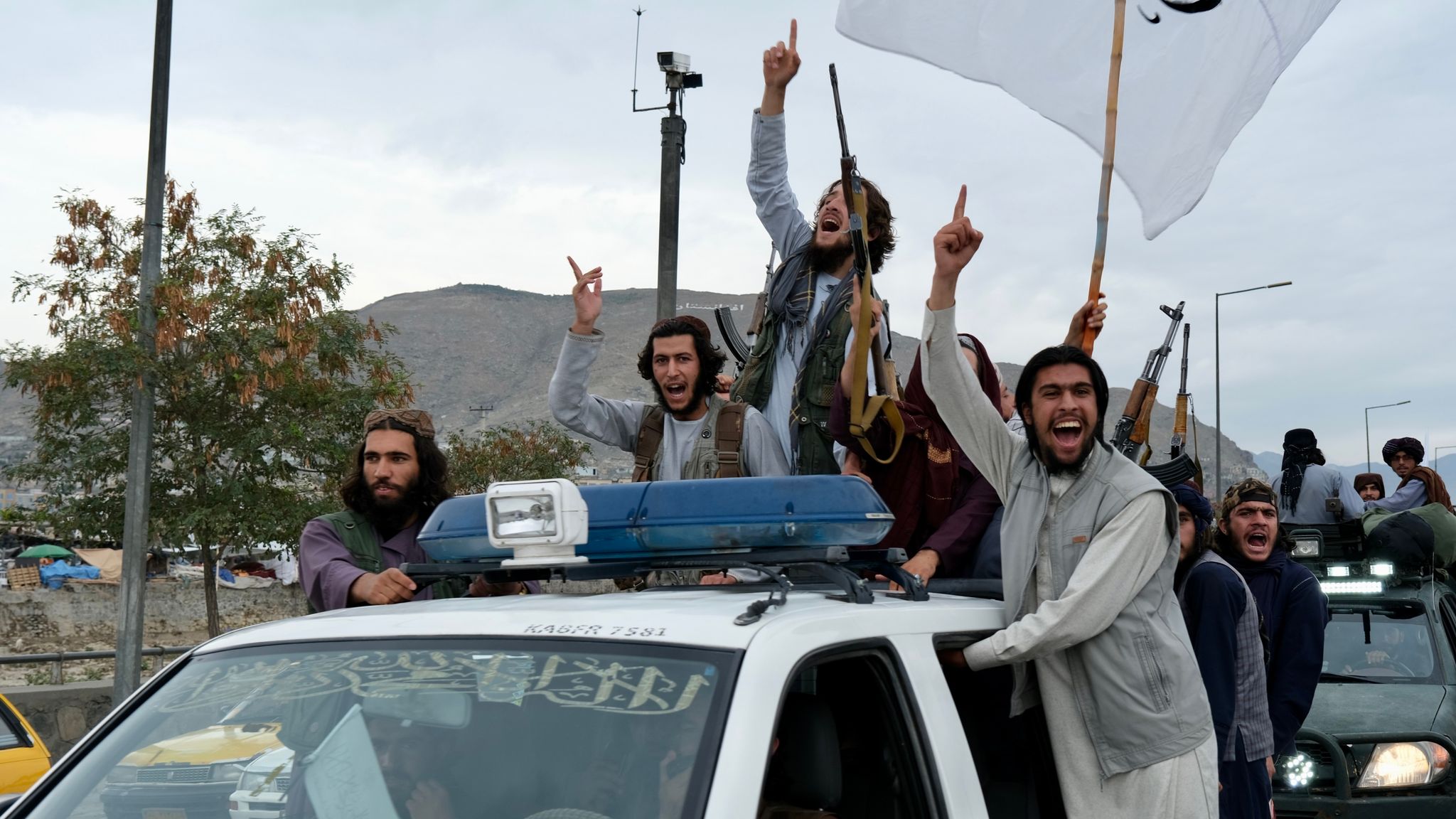
One year ago, America lost yet another war. Afghanistan is right back where it was two decades ago, under control of the Taliban. The question is: what, if anything, have we learned?
Make any mistake you like, but don’t make the same mistake twice—or four times. The U.S. committed the same errors of omission and commission in Vietnam, and then Iraq; our failure to draw intelligent conclusions from those conflicts and apply them going forward led us to squander thousands of more lives and billions of more dollars in Afghanistan. Here we go again: unless we learn from our decision to go to war against Afghanistan and then occupy it, we are doomed to our next debacle.
Afghanistan Lesson #1: When politicians tell you that war is necessary and justified, always be skeptical.
President George W. Bush told us that we had to invade Afghanistan in order to bring Osama bin Laden to justice for 9/11. Almost certainly false; the guy was probably in Pakistan. And if bin Laden was in Afghanistan, Bush could have instead accepted the Taliban’s repeated offers to extradite the accused terrorist. Bush argued the war was necessary to take out four training camps allegedly used by Al Qaeda. But Bill Clinton bombed six such camps using cruise missiles in 1998, no war required.
Bush’s casus belli for Afghanistan made no more sense than his evidence-free weapons of mass destruction in Iraq or the fictional Tonkin Gulf incident LBJ used to get us into Vietnam. It’s long overdue for American voters to download and install a sturdy BS detector about wars, particularly those on the other side of the planet.
Lesson #2: Never install a puppet government.
Of the countless mistakes the U.S. made in Vietnam, no single screwup led to more contempt for the United States than its sustained support for the deeply unpopular, brutal, autocratic president of South Vietnam, Ngo Dinh Diem. Saddam Hussein looked positively brilliant in comparison to the exiled con man, Ahmed Chalabi, whom Bush tried to replace him with. Rather than allow Afghans at the post-invasion loya jirga council meeting to choose their own ruler, like the long-exiled king, the U.S. pulled strings behind the scenes by buying the votes of corrupt warlords in support of the dapper Hamid Karzai, who had little popular support. Three years later, even the establishment New Yorker conceded that “if American troops weren’t there, Karzai almost certainly wouldn’t be, either.”
The U.S. propped up Karzai and his successor and close ally Ashraf Ghani for 17 more years.
Lesson #3: Never try to exclude an entire political party or group from a nation’s political life.
The Taliban’s base of power was the ethnic Pashtuns who comprised 40% of Afghanistan’s population. Yet the Taliban were not permitted to attend the loya jirga. They could not run in parliamentary elections under the U.S.-backed puppet government. Marginalized and “alienated from the central government, which they believe[d was] unfairly influenced by non-Pashtun leaders and interests,” in the words of a prescient 2009 Carnegie Endowment white paper, they had two options: stand down and shut up, or resort to guerilla warfare.
The U.S. messed up the same way in Vietnam and Iraq. In U.S.-backed South Vietnam, communists and their nationalist allies were excluded from electoral politics. Iraq’s Sunnis, 32% of the nation, lost their leader when Saddam was overthrown by U.S. forces, got fired from the military and other jobs by Bush’s idiotic deBaathification policy and humiliated by America’s new darlings, Shia politicians and their factions—sparking a bloody civil war and leading to U.S. defeat.
Lesson #4: Never be a sore loser.
European powers that offered financial assistance and training to their former colonies after independence in places like Africa continued to enjoy influence within those countries. Examples include the UK’s relationship with India and France’s role in Mali, Senegal, the Central African Republic and even Algeria, which cast off the French yoke after an eight-year-long struggle famously characterized by torture and terrorism.
The United States should try something similar when it loses its wars of aggression: lick its wounds, acknowledge its mistakes and offer to help clean up the messes it makes when it withdraws from a country strewn with mines and cluster bombs.
It took 20 years before the U.S. reengaged with Vietnam after the fall of Saigon—two decades of squandered rapprochement and lost international trade. This occurred despite the precedent of World War II, in which U.S. occupation authorities worked to insinuate themselves with their defeated enemies Germany and Japan almost on day one, two relationships that paid off for all concerned.
Its nose bloodied by its debacle in Iraq, the U.S. has allowed Iran to become the dominant outside power inside the country.
And now the U.S. is doing the same thing in Afghanistan as in Iraq—nothing. Afghans are gaunt and hungry because of drought and the U.S. decision to cut off aid and frozen Afghan government funds. The economy is collapsing. The enormous U.S. embassy in Kabul is closed, making it impossible for Afghans to contact the U.S. government.
All that investment of money and time, and who will get the more than $1 trillion in untapped natural resources, including copper, lithium, and rare-earth elements? China, most likely. If the U.S. could get over itself, it might salvage some influence over the new Taliban government in Kabul and open new markets. Let girls go to school and women work, President Biden could tell them, and we’ll release some funds. Arrest and hand over figures like the recently droned Ayman al-Zawahiri, who was living in Kabul, and we’ll restore aid. Carry out more reforms and we’ll establish diplomatic ties.
Picking up your toys and going back to your house after losing a fight might feel good. But it’s immature and counterproductive in a world in which success depends on having friends and collaborators.
(Ted Rall (Twitter: @tedrall), the political cartoonist, columnist and graphic novelist, co-hosts the left-vs-right DMZ America podcast with fellow cartoonist Scott Stantis. You can support Ted’s hard-hitting political cartoons and columns and see his work first by sponsoring his work on Patreon.)

